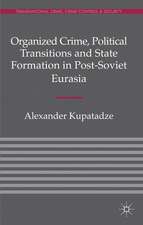New Perspectives on Desistance: Theoretical and Empirical Developments
Editat de Emily Luise Hart, Esther F.J.C. van Ginnekenen Limba Engleză Hardback – 29 iun 2017
This book brings together a collection of emergent research that moves the debate on desistance beyond a general consideration of individual and social structural influences. The authors examine empirical developments which have implications for policy surrounding resettlement and re-offending, but also for punishment practices. Presenting thought-provoking theoretical advances and critiques, the editors challenge and enrich traditional understandings of desistance. A wide range of chapters explore how some criminal justice interventions hinder the desistance process, but also how alternative approaches may be more helpful in promoting and supporting desistance. Thorough and diverse, this book will be of great interest to scholars of criminology and criminal justice, social policy, sociology and psychology, and of special interest to researchers and practitioners working with (ex-)offenders.
| Toate formatele și edițiile | Preț | Express |
|---|---|---|
| Paperback (1) | 688.87 lei 6-8 săpt. | |
| Palgrave Macmillan UK – 29 iul 2018 | 688.87 lei 6-8 săpt. | |
| Hardback (1) | 693.84 lei 6-8 săpt. | |
| Palgrave Macmillan UK – 29 iun 2017 | 693.84 lei 6-8 săpt. |
Preț: 693.84 lei
Preț vechi: 846.14 lei
-18% Nou
Puncte Express: 1041
Preț estimativ în valută:
132.79€ • 140.99$ • 110.00£
132.79€ • 140.99$ • 110.00£
Carte tipărită la comandă
Livrare economică 25 decembrie 24 - 08 ianuarie 25
Preluare comenzi: 021 569.72.76
Specificații
ISBN-13: 9781349951840
ISBN-10: 1349951846
Pagini: 240
Ilustrații: XI, 301 p. 3 illus.
Dimensiuni: 148 x 210 x 24 mm
Greutate: 0.53 kg
Ediția:1st ed. 2017
Editura: Palgrave Macmillan UK
Colecția Palgrave Macmillan
Locul publicării:London, United Kingdom
ISBN-10: 1349951846
Pagini: 240
Ilustrații: XI, 301 p. 3 illus.
Dimensiuni: 148 x 210 x 24 mm
Greutate: 0.53 kg
Ediția:1st ed. 2017
Editura: Palgrave Macmillan UK
Colecția Palgrave Macmillan
Locul publicării:London, United Kingdom
Cuprins
Section 1. Desistance Pathways for Specific Offender-Groups.- Chapter 1. Narratives of Punishment and Frustrated Desistance in the Lives of Repeatedly Criminalised Women; Serena Wright.- Chapter 2. ‘I Want to Be a Dad to Him, I Don’t Just Want to be Someone He Comes and Sees in Prison’; Emily Turner.- Chapter 3. The Desistance Process of Offenders Who Misuse Drugs; Charlotte Colman and Freya Vander Laenen.- Chapter 4. Desistance after Life Imprisonment; Marieke Liem.- Section 2. Promoting Desistance in a Prison-Context.- Chapter 5 Spatial Autonomy and Desistance in Penal Settings. Case Study; Jessica Bird.- Chapter 6. Altruistic Prison Programmes in America; Barbara J. Cooke.- Chapter 7. Supporting Families, Promoting Desistance?; Cara Jardine.- Chapter 8. Prison Visits and Desistance: A Human Rights Perspective; Marie A. Hutton.- Leaving behind the Deviant Other in Desistance-Persistence Explanations; Catalina Droppelmann.- Constrained Agency: The Role of Self-Control in the Process of Desistance; Esther F.J.C. van Ginneken.- Prisoners Post Release: The Need for a ‘Critical Desistance’; Emily Luise Hart.- Afterword: New Perspectives and the Future of Desistance: An Afterword
Notă biografică
Emily Luise Hart is Lecturer in Criminology at Lancaster University Law School, UK.
Esther F.J.C. van Ginneken is Assistant Professor of Criminology at the Institute for Criminal Law and Criminology, Leiden University, The Netherlands.
Textul de pe ultima copertă
This book brings together a collection of emergent research that moves the debate on desistance beyond a general consideration of individual and social structural influences. The authors examine empirical developments which have implications for policy surrounding resettlement and re-offending, but also for punishment practices. Presenting thought-provoking theoretical advances and critiques, the editors challenge and enrich traditional understandings of desistance. A wide range of chapters explore how some criminal justice interventions hinder the desistance process, but also how alternative approaches may be more helpful in promoting and supporting desistance. Thorough and diverse, this book will be of great to scholars of criminology and criminal justice, social policy, sociology and psychology, and of special interest to researchers and practitioners working with (ex-)offenders.
Caracteristici
Highlights desistance pathways for specific offender-groups within a prison context Explores new theoretical perspectives in the study of desistance Draws on diverse expert research on specific populations and the relationship between non-penal interventions and desistance












